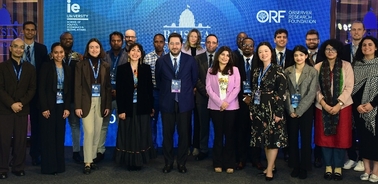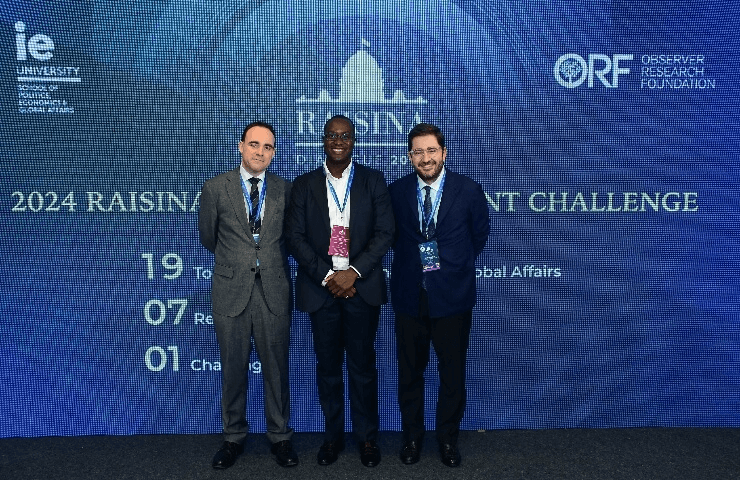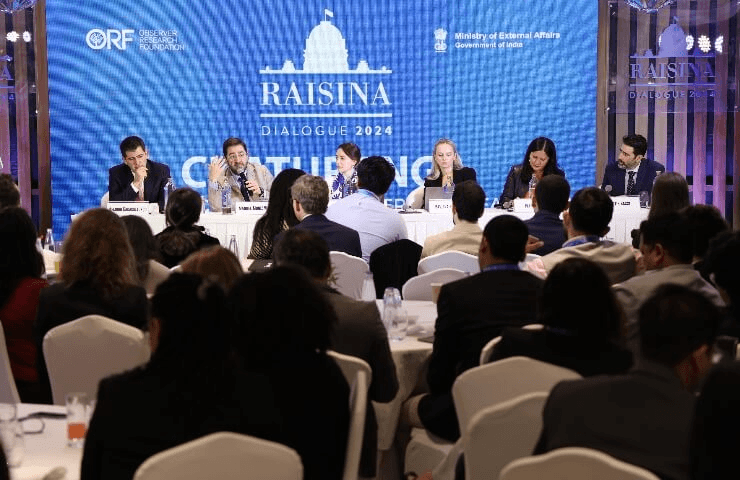IE School of Politics, Economics and Global Affairs participates in the Raisina Dialogue 2024 and launches the Raisina-IE Global Student Challenge

IE University and the Observer Research Foundation launched the 2024 Raisina-IE Global Student Challenge to engage students from Schools of Government and Global Affairs from across the globe in global governance discussions.
IE University has contributed actively to the debate at the Raisina Dialogue 2024, India's premier conference on geopolitics and geoeconomics, held in Delhi this week. Within the framework of this event, the IE School of Politics, Economics and Global Affairs and the Observer Research Foundation (ORF) launched the Raisina-IE Global Student Challenge, engaging students from Schools of Government and Global Affairs from across the world to discuss and propose solutions for global governance issues.
Manuel Muñiz, Dean of IE School of Politics, Economics, and Global Affairs and Provost of IE University, took part in a panel called “Digital Utopia: Seeking Light at the End of the Tunnel.” The discussion focused on regulatory consensus, digital cooperation, and the role of citizens in policymaking. The conversation highlighted the challenges and opportunities in the evolving digital landscape."
He was joined by Kris Lovejoy, Global Practice Leader for Security & Resiliency at Kyndryl (US), Memduh Karakullukçu, Founding Board member & President of the Global Relations Forum, (Turkey), Louise Marie Hurel, Research Fellow - Cyber Programme at the Royal United Services Institute (UK) and Pavlina Pavlova, Public Policy Advisor at the CyberPeace institute (Austria) in this conversation moderated by Justin Bassi, Executive Director of the Australian Strategic Policy Institute, Australia.
Ilke Toygür, Director of the IE Center for Innovation in Global Politics and Economics at IE School of Politics, Economics and Global Affairs, moderated a session on the future of the Western Balkans. The "IdeasPod" session with Marija Risteska, Founder and Executive Director of the Center for Research and Policy Making in North Macedonia, and Ornela Çuçi, Vice President of IKAR Holdings, in Albania, explored the EU integration of the Western Balkans, as well as the speakers’ vision for the Western Balkans in the broader geopolitical landscape. This session will be released podcast-style on ORF platforms following the conference.
Raisina-IE Global Student Challenge
The 2024 Raisina-IE Global Student Challenge, organized by IE School of Politics, Economics and Global Affairs in collaboration with the Observer Research Foundation (ORF), brought together students from 19 leading Schools of Government and Global Affairs. Both institutions created inter-university and inter-regional teams, thereby fostering bridges between academic institutions in diverse geographic areas.
“It is important that global academic institutions come together to debate and to suggest solutions to pressing global challenges. One way of doing this is by involving our students in activities like the one we just co-hosted at Raisina. This is all about learning and working outside of the classroom. Learning by doing.”
Manuel Muñiz, Dean of IE School of Politics, Economics and Global Affairs and Provost of IE University
This year’s challenge theme focused on “The International Climate Change Regime”. Students had four weeks to tackle a specific problem and propose actions to fight climate change. Following three weeks of analysis and virtual collaboration, participants gathered in Delhi to network and present their policy proposals. The proposals were evaluated by a jury panel consisting of Marise Payne, Former Minister for Defence and Foreign Affairs of Australia, Carl Bildt, Former Prime Minister of Sweden, and Dhruva Jaishankar, Executive Director of Observer Research Foundation America.
Team 5, with the proposal "Towards LT-LED: A Digital Climate Accountability Framework Approach," was declared the winner. The team included Bruno Daniel Ygosse Battisti of Fundação Getulio Vargas, Abdul Omar Maziko of Tsinghua University, Aurelie Chapon of the University of Toronto, and Joy Isoyiza Usman of the University of Ibadan. Professor Robert Mizo of the University of Delhi advised the winning team.

To address the limitations of current global governance frameworks, the winning team proposed the Digital Climate Accountability System. This system aims to enhance data gathering, reporting, and transparency in climate-related obligations, utilizing advanced technologies and Artificial Intelligence (AI) to monitor carbon emissions, track technology and financial transfers, and prioritize social inclusion.
Team 3, named the runner-up, included Karina Sánchez Bazán from Tecnológico de Monterrey, Virendra Kumar of the University of Delhi, Shantanu Roy-Chaudhury from Nanyang Technological University, and Peng Liu from NYU Abu Dhabi. Advised by Professor Claudia Yoshinaga of Fundação Getulio Vargas, their presentation advocated for creative financing strategies to expedite climate action in Latin America, the Caribbean, Asia, and Africa through improved access to capital.
One participant, Emmanuel Capochichi, represented IE University in Madrid, while others hailed from institutions such as Georgetown University (School of Foreign Service), University of Toronto (Munk School), SciencesPo, King's College London, NYU Abu Dhabi, Tsinghua University, and many others.
Following their participation in the Raisina Dialogue, students will work as a cohort to synthesize their proposals into a unified policy recommendation for the future of global climate governance.
